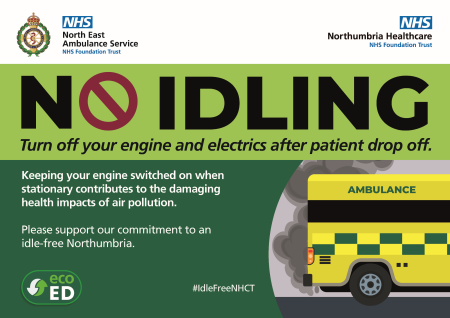Publish date: 16 October 2025
NHS trusts join forces to sign no idling commitment outside of emergency departments

Five NHS trusts across the North East plus the Integrated Care Board (ICB) have joined Northumbria Healthcare, Newcastle Upon Tyne Hospitals (NUTH) and the North East Ambulance Service (NEAS) in a commitment to reducing idling of vehicles and ambulances outside of their emergency departments.
In Summer 2024, both Chief Executives of Northumbria Healthcare and NUTH signed the commitment along with former CEO of NEAS, Helen Ray, to ask ambulance crews to turn off their engines when waiting outside their emergency departments. Since then, the ambulance service’s new chief executive, Kev Scollay, has also signed the agreement.
Leaving ambulance engines running when it isn’t clinically necessary for them to remain switched on produces harmful emissions such as nitrogen dioxide. This can collect in the air surrounding the department and negatively impact the health of patients, staff and visitors, particularly children, pregnant women, the elderly and those with underlying health conditions.
This also extends to patient, staff and visitor vehicles as these produce the same harmful emissions, contributing to lower air quality on hospital sites.
A year on from signing the commitment, five other trusts plus the ICB have joined forces to commit to reducing vehicle idling:
- Gateshead Health NHS Foundation Trust
- County Durham and Darlington NHS Foundation Trust
- South Tyneside and Sunderland NHS Foundation Trust
- University Hospitals Tees (South Tees Hospitals NHS Foundation Trust and North Tees and Hartlepool NHS Foundation Trust)
- NHS North East and North Cumbria Integrated Care Board
Creating a no idling policy was one of the action points for the Royal College of Emergency Medicine’s GreenED initiative which focuses on reducing the environmental impact of emergency medicine while maintaining a high standard of patient care. Recently, the trust was accredited gold in recognition of the changes that have been implemented to combat climate change.
Clare Winter, head of sustainability at Northumbria Healthcare, said: “Tackling the impacts of climate change is everybody’s responsibility. By joining forces with other trusts in the region, we are creating a united approach in making positive changes to improve air quality for the people in our communities.”
Claire Riley, chief corporate services officer, NHS North East and North Cumbria Integrated Care Board, said: “We're proud to stand alongside our NHS trusts in this important commitment. Reducing idling is a simple yet powerful step that protects the health of our patients, staff and visitors while also reducing harmful emissions. By working together, we can make our hospital sites healthier environments and contribute to the wider goal of tackling climate change across our region.”
Martin Gibson is the environmental and sustainability manager for NEAS. Reflecting one year on since supporting the service in signing the agreement, he said: “Reducing the environmental impact of our fleet is a key target for us to make our service more sustainable. More partner organisations signing this agreement means that more of the region is taking action to make a positive impact on the environment for many generations to come.”
David Malone, Senior Trust Transportation Lead at Newcastle Upon Tyne Hospitals, said: “At Newcastle Hospitals we are committed to no-idling at our sites, to reduce the impacts of air pollution on our patients, staff and visitors. We do not want those attending hospital and accessing our services, to be breathing air that might put them at more harm. We are collaborating regionally on our wider strategy to increase rates of active and sustainable travel and reduce vehicular access to our sites.”
